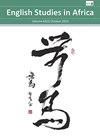Elemental Humanity in Bessie Head’s When Rain Clouds Gather
IF 0.5
4区 文学
0 LITERATURE
引用次数: 1
Abstract
Abstract In this essay I read Bessie Head’s novel When Rain Clouds Gather from a broadly eco-materialist perspective, arguing that the social transformation of the protagonist, Makhaya Maseko, is fundamentally bound up with the text’s nuanced descriptions of the physical environment. Charting Maseko’s departure from the toxic milieu of apartheid South Africa, and his gradual process of settling into a new lifeworld in the village of Golema Mmidi, I argue that his familiarization with the material grounds of life in a new clime provides an elemental coherence that enables the structuring of his personal narrative into a meaningful system. Through a series of close readings, I demonstrate that the novel’s expression of a composite ecological being is also reflected in the stylistic idiosyncrasies of Head’s writing. Throughout, I draw on Head’s correspondence, and on biographical aspects of her life, to situate Makhaya’s journey against a larger theme of struggling to make a home in the face of social alienation and the bureaucratic indifference of the nation-state. Reference to the work of anthropologists like Tim Ingold and Hannah Knox situates my argument in the context of a larger ontological move in debates around the relationship between nature and culture.Bessie Head的《乌云密布时》中的人性元素
摘要在这篇文章中,我从一个广泛的生态唯物主义视角阅读了贝西·海德的小说《当雨云聚集》,认为主人公Makhaya Maseko的社会转型从根本上与文本对物理环境的细致入微的描述联系在一起。在描绘马塞科离开南非种族隔离的有毒环境,以及他在Golema Mmidi村逐渐融入新生活世界的过程时,我认为,他对新气候下生活物质基础的熟悉提供了一种基本的连贯性,使他的个人叙事能够构建成一个有意义的系统。通过一系列细读,我证明了这部小说对复合生态存在的表达也反映在海德写作的风格特质中。在整个过程中,我利用海德的信件和她生活的传记方面,将Makhaya的旅程与一个更大的主题放在一起,即面对社会疏离和民族国家的官僚冷漠,努力建立一个家。引用蒂姆·英格尔德和汉娜·诺克斯等人类学家的作品,使我的论点处于围绕自然与文化关系的辩论中更大的本体论运动的背景下。
本文章由计算机程序翻译,如有差异,请以英文原文为准。
求助全文
约1分钟内获得全文
求助全文

 求助内容:
求助内容: 应助结果提醒方式:
应助结果提醒方式:


